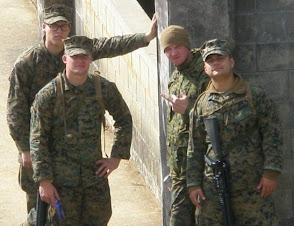
 Sir Winston Churchill with tommy gun in the field
Sir Winston Churchill with tommy gun in the fieldTo a certain degree, all this is understandable. One of the great boons of our internet age is the easy access that Google affords to information. A quick computer search and a visit to Wikipedia are often all the effort that many of us are willing to expend when it comes to tracking down information on a subject of interest. This convenient practice is fine for some topics — I indulge in it myself — but when it comes to biographical issues, it can be a little problematical: the facts about any important person may be in dispute or incomplete, and then there is always the possibility that the anonymous writer or writers may shape their narratives based on undeclared biases of their own. Moreover, when it comes to controversial individuals, internet sources can occasionally transform ‘conventional wisdom’ or ‘popular myth’ into ‘recognized fact’. This is not an inconsequential problem, and it is why I try to rely on books or essays for important information. With attributed material, even if the author is incorrect or seems to have a personal agenda, at least the reader knows where the material is coming from.
 Alanbrooke conversing with Montgomery
Alanbrooke conversing with MontgomeryThis issue of attribution and accuracy — for those of us with a long-time interest in history, military or otherwise — is important because, outside of the political biographies, probably no area of writing is more prone to exaggeration, account settling, and personal bias than that of military biography. After all, the author chose his or her subject for a reason, and that reason typically was not rooted in an unsympathetic or hostile view of the person being chronicled. “Facts may be stubborn things,” to paraphrase John Adams, but personal recollections of those facts are often not nearly so reliable. Thus, it is probably not surprising that many people, like me, who read widely in this genre, tend to be sensitive to the potential for biography to slip into hagiography. In short, a little skepticism in such cases is almost always useful. Where the writer’s biases and predilections can sometimes sneak through without detection, however, is in his or her treatment of the ‘supporting cast’ of the larger narrative. A biographer of the one-time commander of the Army of the Potomac, George B. McClellan, might very well take a different and more sympathetic view of the Civil War general than that, for example, taken by a biographer of McClellan’s wartime superior, Abraham Lincoln. This, it seems to me, is where short but well-sourced biographical ‘sketches’ of important historical players really come into their own. These types of writings allow a reader to quickly balance the biographer’s treatment of the main character’s ‘supporting cast’ against the sometimes countervailing opinions of other, less-invested scholars. This type of balance is welcome in every area of biographical inquiry, but probably no more so than when it comes to the relatively recent military biographies emerging out of the Second World War.
 Field Marshall Sir Claude John Eyre Auchinleck
Field Marshall Sir Claude John Eyre AuchinleckIt is for this reason that I personally found ‘Churchill’s Generals’ so useful. Almost any biography of Winston Churchill that describes his leadership during World War II will paint, at least to some degree, the generals who served under him with Churchill’s own often colorful verbal brush. The legendary British Prime Minister, after all, was a master of the written and spoken word, and the words that he applied to those around him, more often than not, stuck. But whether they stuck or not, the question to be asked is: were Churchill’s words accurate or even true? How, for instance, should Alanbrooke’s, or Wavell’s, or Auchinleck’s, or Percival’s, or even Montgomery’s strengths and weaknesses be evaluated when seen through other, more dispassionate eyes than those of Britain’s wartime Prime Minister? In short, what were the actual historical backgrounds, accomplishments, and failures of the men who commanded the Commonwealth’s forces in Europe, North Africa, the Middle East, and the Far East in the years, 1940-1945?
 General Alan Percival
General Alan Percival‘Churchill's Generals
 General Archibald Wavell
General Archibald WavellIt should be noted that ‘Churchill’s Generals’ is not primarily concerned with assessing the wartime accomplishments of the legendary British Prime Minister; hundreds of other serious historical works have already tackled that important task; instead, it is focused on the men who — sometimes successfully and sometimes not— attempted to translate Churchill’s occasionally grandiose wartime schemes into action. This means that, outside of John Keegan’s introductory remarks about the life experiences that shaped the famous British leader’s military views and prejudices, there is actually very little of Churchill, himself, in this work. Instead, the main value of the different essays in ‘Churchill’s Generals’, as noted previously, comes from the fact that each, in its turn, presents a brief but balanced profile of one of the important historical players who appear, again and again, in the many other historical narratives about the British army during World War II. Finally, this work can also serve another useful purpose for the amateur student of history; these short, well-written biographical sketches might just be enough to encourage the interested reader to further explore the life stories of one or more of these officers in more detail.
‘Churchill's Generals









0 comments:
Post a Comment